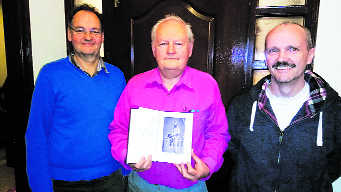Rattrays keen to keep alive Indian Army ties
Ajay Banerjee
Tribune News Service
New Delhi, January 29
Brothers James, David and Hugh from Scotland are passionate about keeping alive their family links with the Indian Army. The three of them are on a visit to India. Their father, Peter Hugh Rattray, was the last British Commander of 3 Sikh Regiment, then known as 45 Rattray’s Sikhs.
(Follow ; and )
In fact, three members of the Rattray family have commanded the regiment during different periods of time.
The brothers will travel to Gurdaspur in Punjab for the centenary celebrations (on January 31 and February 2) of the regiment’s role in World War-I (1914-1918), then commanded by HB Rattray, their grandfather.
They are carrying a book published by their family, detailing the events during 1856-1858. It is based on notes prepared by their great-grandfather, Col Thomas Rattray, who founded the regiment in 1856.
The ‘Rattray Sikhs’, originally raised as Bengal Military Police Battalion, consisted of a large number of former soldiers in Maharaja Ranjit Singh’s Army. “Till the time our father died in 1994, we had only heard stories of this mystical regiment. In 1997, Col (later Brigadier) JM Devadoss (retd) invited us here and we were able to revive our links,” says James.
“Our friends back home too are excited over our India connect,” say Hugh’s children Patrick (28) and Rhiannon (25).
The Rattray brothers run an Anglo-Sikh ‘heritage trail’ in Scotland to help connect local people and tourists with places associated with Maharaja Duleep Singh, the last Sikh ruler of Punjab, who spent most of his life in Britain.










